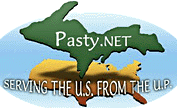By Charlie at Pasty Central (Chopper) on Sunday, October 19, 2014 - 02:48 pm:
I've been asked why we refer to northern Michigan Indians sometimes as Chippewa and sometimes as Ojibwa. They are alternate names of the same people-group, which include other variations: Chippewe, Chippeway, Ojibwe, Ojibway, Otchipwe, Otchipwa, Otchipway. I've been reading some of the old books from the 19th century - which are freely available on the Google Books project - where we find all of these variations. In the History of the diocese of Sault Ste, Marie and Marquette you'll find Bishop Baraga referring to the "Chippewa Indians" and to their "Otchipwe" Language.
Interesting side-note: The picture of Bishop Baraga that appears in a number of our Days in History has the following caption on the Library of Congress website:
Bishop Frederic Baraga, three-quarter length portrait, facing three-quarters to right, seated, in clerical robes, holding his Dictionary of the Otchipwe Language

...and I always just thought it was a Bible.
I suppose I lean toward using "Chippewa". That is the official name appearing in every treaty between the U.S. government and the people-group, as well as being the name of a county in the U.P. I've also read that the "Ojibwe" variation is more prevalent in Canada, whereas "Chippewa" is more widely used in the U.S. This can be seen in Wikipedia, where the word Chippewa actually redirects to Ojibwe, in keeping with Wikipedia's tacit policy of "de-Americanizing" where possible. (or maybe the more positive way of stating it would be "globalizing" where possible).
Either way, the Chippewa/Ojibwa are an important part of the U.P.'s heritage, and I'm sure we'll be coming along their paths in future Day's in History. By the way, if you live in the coverage area of TV 10 in Marquette, tomorrow the station will begin carrying our Day in History minutes as part of their regular morning programming. You'll still be able to catch them here, or on Facebook.
Have a good week :o)







